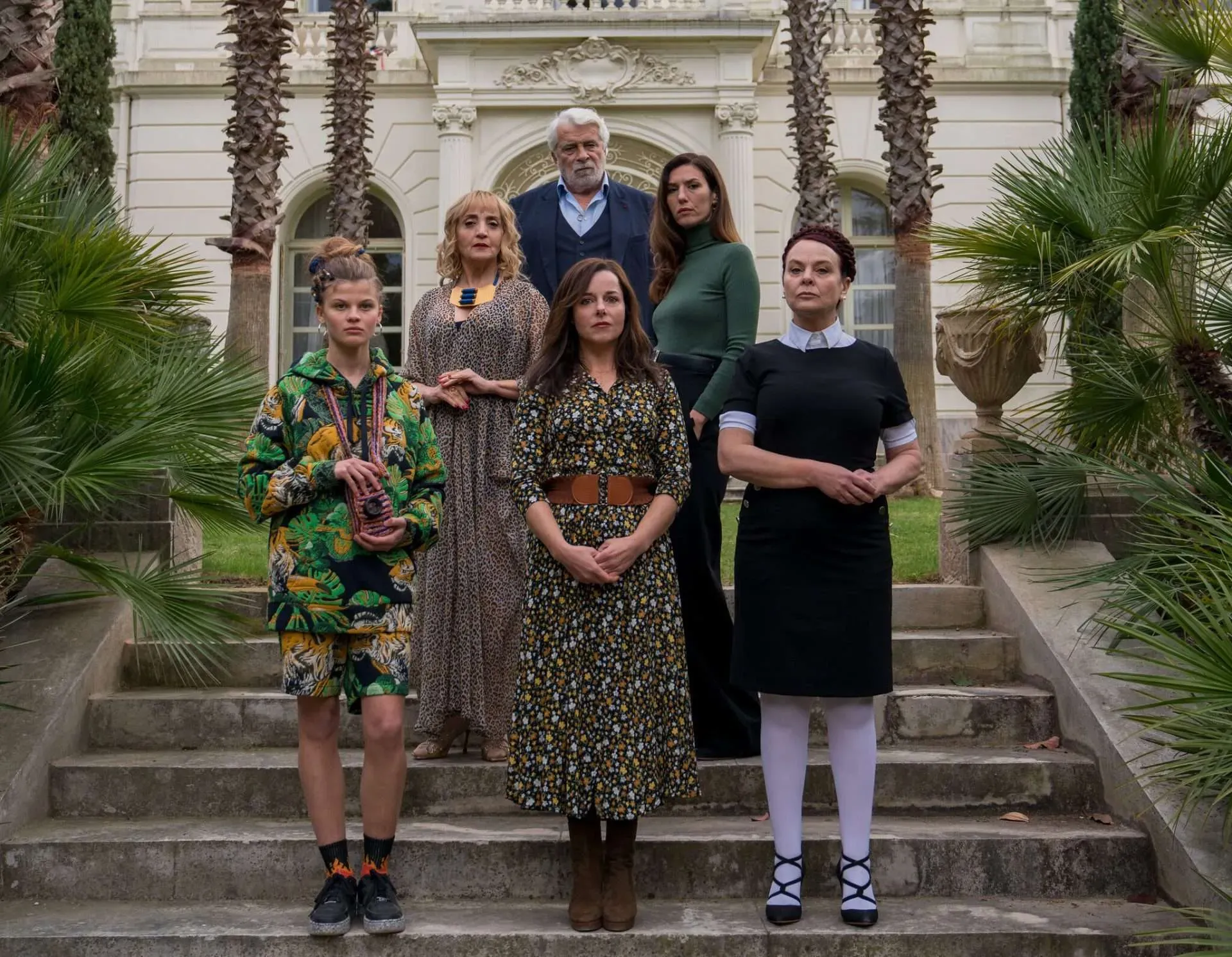The Origin of Evil (L’Origine du Mal) presents a thrilling French drama that holds your attention from beginning to end. At the centre of this story is a woman named Stephane, who makes contact with Serge Dumontet, a rich businessman she believes to be her biological father.
Right from the start, questions arise surrounding Stephane’s motives, both among the audience and the Dumontet family. As the events progress, unexpected turns begin to shape the storyline. The mixture of serious tone and exaggerated characters gives the film a unique appeal, making it worth watching.

Plot Summary: What Is The Film About?
Stephane is introduced as a factory worker in a fish-packing plant, clearly unsatisfied with how her life has panned out. Her only romantic relationship, with a woman currently in prison, is under stress due to the limited visiting times.
Living a lonely existence in a rented room owned by an elderly woman, Stephane finds little joy in her everyday routine. However, things begin to change after she manages to track down a phone number linked to her birth father—something she’s long wanted to do. Her mother had told her that she was born from an affair, but it took her a while to find proof.
She dials the number a few times but hangs up each time before speaking, too nervous to say anything. Eventually, she manages to gather the courage and gets a surprisingly warm response. Serge, the man she calls, asks her to come over to Porquerolles, a scenic island in the Cote d’Azur.
This is where Stephane and Serge meet face-to-face for the first time. During the meeting, Stephane tells him she holds no resentment over his absence during her childhood.
Her visit, she claims, is simply about connecting with her family. However, her situation back home worsens when her landlady’s estranged daughter returns and forces her out of the apartment.
Serge, seeing her distress, invites her to stay at his estate. But his household doesn’t take kindly to the new guest. His wife, Louise, and their daughter, George, immediately grow suspicious, assuming Stephane is there to lay claim to Serge’s wealth.
Alongside the family’s loyal housekeeper, Agnes, they try various ways to keep her away. Yet, the bond forming between Serge and Stephane gradually strengthens, and soon, she settles into the grand home, gaining what feels like a new family.
Is Stephane Truly Serge’s Daughter?
Although Serge remains the head of the family business, George is the one calling the shots. Serge accuses her of trying to push him out and steal what belongs to him. His dislike for George is evident, and it’s mutual—she doesn’t shy away from showing her anger.
George is working on legal grounds to have her father declared incapable of running the business, which would give her complete authority. Given these conditions, it’s understandable that she questions the authenticity of Stephane’s identity. After all, with Serge’s fortune hanging in the balance, any sudden newcomer would be met with doubt.
George’s suspicion seems fair enough, as she asks for evidence that Stephane is truly who she claims to be. There are no identification papers, and even after searching Stephane’s belongings, George finds nothing to confirm her story.
The viewers also get a peek at Stephane’s tendency to twist the truth when she allows Serge to believe she owns the fish factory, instead of telling him she’s just an employee. Rather than correcting him, she crafts an elaborate story about how she bought the place and turned it around financially.
Later on, Stephane solves the identification problem by getting a fake ID through old contacts, now going by the name Stephane Marson. This leads to the truth finally coming to light—she is actually a woman named Nathalie Cordier, a repeat offender with a history of deception.
Her partner, the real Stephane Marson, is in prison for allegedly murdering her previous lover. Nathalie and Stephane met during their time behind bars and developed a relationship.
It was through these conversations that Nathalie learned about Stephane’s past and created a plan to impersonate her and gain access to the Dumontet fortune.
What Does Nathalie Discover About Serge?
At first glance, Serge appears to be a helpless man at the mercy of a hostile family. Louise speaks sharply to him, George shows open hostility, and Agnes keeps tabs on his every move. He even tells Nathalie that George is trying to take everything from him.
These circumstances make it look like he is being unfairly treated by his household. He later asks Nathalie to testify in court, supporting his claim that he is of sound mind and capable of managing his affairs. She agrees at the time, seemingly touched by his plight.
But as time passes, a different side of Serge starts to come to light. His offensive remarks about Agnes, whom he stereotypes based on her background, raise red flags. His violent actions towards Louise and disrespectful behaviour towards Nathalie hint at a deeper, darker personality.
More revelations follow—George stands up to her father because of years of abuse, and his son Frederic had suffered under him for being gay, eventually leaving home forever. Serge continues to deny his son’s existence, insisting he is dead.
With this knowledge, Nathalie’s sympathy gradually changes. She begins to understand why George had tried to keep her away. Realising that Serge only wanted to use her, Nathalie decides against testifying in his favour. His reaction is violent and demeaning, showing that his kindness had always been conditional.
At the court hearing, Nathalie turns the situation on its head by declaring that Serge is both mentally and physically unwell, even accusing him of abuse. The verdict puts George in charge of the business, while Serge suffers a heart attack and is hospitalised.
While in the hospital, Serge confesses something shocking—he had known all along that Nathalie wasn’t his daughter. He had investigated Stephane’s story, even attending her trial. He had allowed Nathalie into his home only because he saw a way to use her against George.
Why does George decide to support Nathalie?
George’s unexpected decision to back Nathalie, despite discovering the truth about her identity, stems from more than just a desire to maintain control of her father’s empire. Once Serge was officially removed from his business responsibilities after being deemed unfit, George gained the full reins of the Dumontet enterprise.
But her actions following this development go beyond business interests. Instead of reporting Nathalie to the authorities for fraud, she starts working alongside her, signaling a change in attitude. George likely sees value in Nathalie’s cunning and courage, especially as she reflects on the toxic environment Serge had cultivated within the family.
After Serge’s heart attack and hospital admission, George acknowledges that her supposed stepsister has not only been honest about her intentions eventually but has also played a major role in exposing Serge’s real behaviour. By testifying in court against him, Nathalie did what nobody in the family had dared to do openly.
This act probably earned her George’s respect. The alliance between the two women shows how George recognises Nathalie’s strengths, and instead of being enemies, they form a strategic relationship. George chooses to keep Nathalie close, both to benefit from her resourcefulness and possibly to keep her actions under control.
Their cooperation goes a step further when they decide to manipulate events for their mutual gain. Nathalie no longer hides her identity as a fraud, and George, rather than punishing her, uses her as an asset in knowing the family’s future. This pairing becomes a way for both women to assert themselves in an environment dominated by Serge’s manipulations for years.
How does the film end?
The Origin of Evil wraps up with a closing sequence that combines irony and subtle revenge. Although Nathalie originally stepped into the Dumontet house with a false identity and selfish goals, her journey results in a profound change in dynamics within the family.

Now allied with George, she becomes part of the household in a much more accepted and even respected way. Meanwhile, Serge’s condition worsens, and he remains in the hospital, stripped of both his power and his influence over the family.
Serge’s true nature being revealed leaves him isolated and powerless, a sharp contrast to his earlier dominance. Nathalie, who had only pretended to be his daughter to access his wealth, ends up helping George, who now has complete authority over the family business.
This development adds a twist of poetic justice—Nathalie’s deception ironically leads to the downfall of a man who had deceived and manipulated his family for decades.
The film concludes without a neat resolution for every character but leaves the audience with the sense that the balance of power has shifted. While Nathalie might still be a con artist, her presence exposed deep flaws within the Dumontet family.
In the end, those who had been sidelined or hurt by Serge, especially George and Louise, are able to take back some control. The story reflects how deception, when matched against deeper wrongs, can sometimes reveal uncomfortable truths and force long-standing power structures to collapse.



